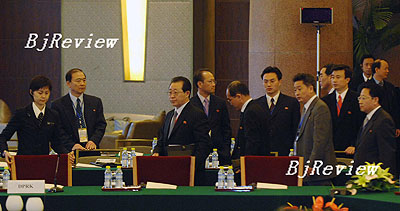
Progress was made at the first phase of the sixth round of six-party talks on the North Korean nuclear issue on March 19-22, when the related parties discussed the implementation of the "initial actions." A recess is called and talks will be resumed "at the earliest opportunity" to continue to discuss and formulate an action plan for the next phase.
The key to a successful outcome of the sixth round of six-party talks is the interaction and preparation the parties made beforehand. The international community believes that the implementation of the "initial actions" specified in the joint document signed on February 13 will be the touchstone for resolving the North Korean nuclear issue.
Under the statement signed on September 19, 2005, North Korea would end its nuclear program in return for economic and energy assistance and the eventual normalization of relations with the United States. On February 13, the six parties issued a document called Initial Actions for the Implementation of the Joint Statement. The February document sets forth steps to be taken in parallel by the parties to implement the joint statement reached last September.
Chinese Foreign Minister Li Zhaoxing stressed that implementing the initial actions program, promoting the process of the six-party talks and denuclearizing the Korean Peninsula are significant to maintain peace and stability in Korea and in Northeast Asia. However, the process of implementing the concrete initial actions saw both progress and difficulties.
On the one hand, the future of the six-party talks is very hopeful. Under the document signed in February, the six nations-North Korea, South Korea, China, the United States, Japan and Russia-agreed to set up five working groups on the denuclearization of the Korean Peninsula, the normalization of North Korea-U.S. relations, the normalization of North Korea-Japan relations, economic and energy assistance and a Northeast Asia peace and security mechanism, to discuss and design plans to carry out the provisions of the joint statement.
Just before the sixth round of the talks was held, working groups on denuclearization headed, economic and energy assistance and a Northeast Asia peace and security mechanism held their first meetings on March 15-17, discussing such issues as North Korea's nuclear claims and how to provide heavy oil as emergency economic aid to North Korea.
In early March, working groups on the normalization of North Korea-U.S. relations and North Korea-Japan relations met in New York and Hanoi, Viet Nam, respectively. Mohamed ElBaradei, Director General of the International Atomic Energy Agency (IAEA) and officials from Australia, the European Union and Indonesia visited North Korea, showing that all sides are actively working to implement the joint statement. As long as the working groups can cooperate, they can be an effective communication system.
| 